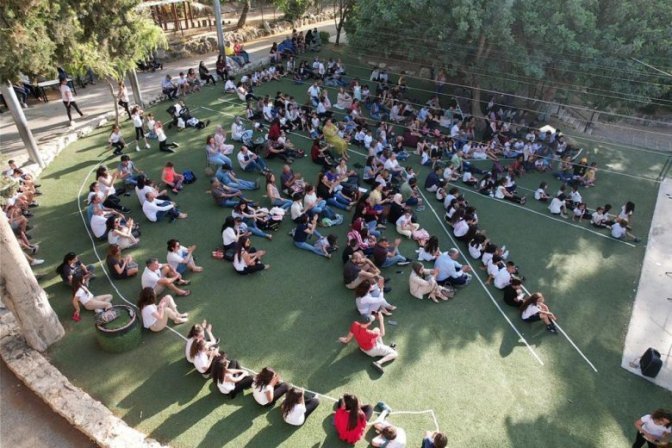Home > Oasis of Peace > Projects & Outreach > Children’s Educational System > The Primary School in May and June
The Primary School in May and June
As the year draws to a close, the community celebrates hope
Thursday 30 June 2022

Celebrating Hope
The school year is fraught with days that remind us that each of us grows up in a community and a religion, with a narrative that shapes our identity. That is why the school has begun a tradition: the Festival of Hope. On the evening of May 31, the entire village, school community and parents’ community were invited for an evening of entertainment, food and fun.
Coming near the end of the school year, it is a way for the children to celebrate the experience they have had over the year of learning and playing with friends of all kinds. And it is a chance for children, parents and village members to come together in the name of peace. The holiday is celebrated at a time when Jews and Arabs in the country are participating in events that remind them of freedom, but also subjugation, occupation and cultural and religious differences. The purpose of the Festival of Hope is not to erase these conflicting narratives, but to add a new one that celebrates not division but hope for peace and a better future.
The children were all dressed in white and they filed into the central school ground where lines had been laid out for them on the ground, showing them where to sit. With the help of a drone photographing them from above, they became a giant human peace sign.
The evening was also a festival of music, dance and theater. The students showed off the skills they had learned over the year in their extracurricular classes; playing instruments, singing, dancing and performing skits. A good laugh was had by all when they announced a skit called “refreshment break,” and the parents stood up and turned toward the tables laden with food.
“It was a peaceful, calm event, and everyone really enjoyed it,” says Reem Nashef, a primary school teacher.
Our representatives to the local council science fair
The sixth-graders representing the school in the local council science fair were prepared with printed posters and new ideas stemming from their hands-on research projects. Using scientific methods, the children had arrived at their conclusions through conducting experiments and observing results.
One team asked: How does the distance between cabbage seedlings or the soil they are planted in affect the yield? Another team investigated the most effective way of keeping a medicinal plant that has become weedy from taking over the garden.
At the end of the fair, the teams proudly displayed the certificates of achievement they received.
Identity and belonging
Who am I? Where do I belong? How do I fit it? How does this group of individuals around me make a wonderful mosaic?
“Identity and belonging” is a crucial segment of the HOTAM Education, Culture, Tradition curriculum now being taught in all the grades. During the “national days” of summer, the emotional side of these issues can be especially strong, and children and teachers alike struggle to grasp and interpret them in a peaceful way.
The mosaics created by the different classes was a way to bring the issues the children have been grappling with into an inclusive, positive framework. Each student and teacher created a “tile” for their section of the mosaic representing a value, emotion or message; these came together in various ways to create a picture that was bigger than the individual words and drawings.
“You children will do what adults can’t,” wrote Nadwa Jaber, a first-grade teacher in the school, about the experience of creating one such mosaic.
Bringing binational education to the Knesset
Bilingual, binational education is still considered an outlier in the Israeli education system, and that means its systems and curricula are not taught in teacher training programs and binational schools do not receive the same government support as those in other recognized educational “streams.” That is why Wahat al Salam/Neve Shalom Communications and Development head Samah Salaime, school principal Neama Abu Delo, primary school teachers, parents and students were in the Knesset for a special hearing on the subject of binational education.
“We have excellent educators, who could educate the entire country on binational education,” said Salaime, “but in the meantime I could not bring our wonderful educational material into this room. The guard outside would not allow it. He thought it was election propaganda.”
“You could create a mixed kindergarten, today, in every city. There is a demand for it,” she added.
Salaime’s speech, on the development of the binational, bilingual primary school in the village and its needs, was followed by contributions by Abu Delo, two teachers and one of the students.
You can view Salaime’s speech (Hebrew with English subtitles) here: https://youtu.be/tK40MNgAjwo










